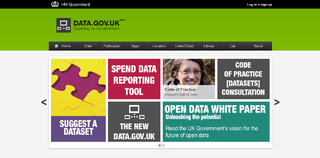Related Research Articles

Her Majesty's Treasury, sometimes referred to as the Exchequer, or more informally the Treasury, is the British government department responsible for developing and executing the government's public finance policy and economic policy. The Treasury maintains the Online System for Central Accounting and Reporting (OSCAR), the replacement for the Combined Online Information System (COINS), which itemises departmental spending under thousands of category headings, and from which the Whole of Government Accounts (WGA) annual financial statements are produced.
The Office for National Statistics is the executive office of the UK Statistics Authority, a non-ministerial department which reports directly to the UK Parliament.

The Identity Cards Act 2006 was an Act of the Parliament of the United Kingdom that was repealed in 2010. It created national identity cards, a personal identification document and European Union travel document, linked to a database known as the National Identity Register (NIR), which has since been destroyed.

The Department for Work and Pensions (DWP) is a British government department responsible for welfare and pension policy. It is the largest governmental department in terms of employees and budget.
A Spending Review or occasionally Comprehensive Spending Review is a governmental process in the United Kingdom carried out by HM Treasury to set firm expenditure limits and, through public service agreements, define the key improvements that the public can expect from these resources.
The Barnett formula is a mechanism used by the Treasury in the United Kingdom to automatically adjust the amounts of public expenditure allocated to Northern Ireland, Scotland and Wales to reflect changes in spending levels allocated to public services in England, England and Wales or Great Britain, as appropriate. The formula applies to a large proportion, but not the whole, of the devolved governments' budgets − in 2013–14 it applied to about 85% of the Scottish Parliament's total budget.
COIN or COINS may refer to:

Directgov was the British government's digital service for people in the United Kingdom, which provided a single point of access to public sector information and services. The site was replaced along with the Business Link website by the new GOV.UK website on 17 October 2012, with the old websites redirecting to the new.
Legislation.gov.uk, formerly the UK Statute Law Database, is the official web-accessible database of the statute law of the United Kingdom, hosted by The National Archives. It contains all primary legislation in force as of 1991, and all primary and secondary legislation since that date; it does not include legislation which was fully repealed prior to 1991. The contents have been revised to reflect legislative changes up to 2002, with material that has been amended since 2002 noted in a table but not yet fully updated.

The Ministry of Justice (MoJ) is a ministerial department of the British Government headed by the Secretary of State for Justice and Lord Chancellor. The department is also responsible for areas of constitutional policy not transferred in 2010 to the Deputy Prime Minister, human rights law and information rights law across the UK.

WhatDoTheyKnow is a site by mySociety designed to help people in the United Kingdom make Freedom of Information requests. It publishes both the requests and the authorities’ responses online, with the aim of making information available to all, and of removing the need for multiple people to make the same requests. The site acts as a permanent public archive of FOI requests made through it.
Public Expenditure Statistical Analyses (PESA) is a programme of HM Treasury in the United Kingdom. It serves two purposes: 1) providing information on government spending plans and outturn and 2) presenting statistical analyses of public expenditure.

data.gov.uk is a UK Government project to make available non-personal UK government data as open data. It was launched in closed beta in September 2009 and publicly launched in January 2010. As of February 2015 it contained over 19,343 datasets, rising to over 40,000 in 2017. data.gov.uk is listed in the Registry of Research Data Repositories re3data.org.

The Office for Budget Responsibility (OBR) is a non-departmental public body funded by the UK Treasury, that the UK government established to provide independent economic forecasts and independent analysis of the public finances. It was formally created in May 2010 following the general election and was placed on a statutory footing by the Budget Responsibility and National Audit Act 2011. It is one of a growing number of official independent fiscal watchdogs around the world.

The June 2010 United Kingdom Budget, officially also known as Responsibility, freedom, fairness: a five-year plan to re-build the economy, was delivered by George Osborne, Chancellor of the Exchequer, to the House of Commons in his budget speech that commenced at 12.33pm on Tuesday, 22 June 2010. It was the first budget of the Conservative-Liberal Democrat coalition formed after the general election of May 2010. The government dubbed it an "emergency budget", and stated that its purpose was to reduce the national debt accumulated under the Labour government.
Whole of Government Accounts (WGA) is the annual publication by the United Kingdom Government of the consolidated financial statements of over 5,500 organisations across the public sector. It aims to provide more complete data for fiscal planning by producing consolidated financial statements which are produced in accordance with the International Financial Reporting Standards (IFRS), the system of accounts used internationally by the private sector.

The Autumn Budget of the British Government is an annual budget set by HM Treasury for the following financial year, with the revenues to be gathered by HM Revenue and Customs and the expenditures of the public sector, in compliance with government policy. The budget is one of two statements given by the Chancellor of the Exchequer, with the Spring Statement being given the following year.
The Efficiency and Reform Group (ERG), established in 2010, was part of the Cabinet Office which worked in partnership with HM Treasury to form the corporate centre for UK Government. Its objectives were to reform the way government works and to support the transformation of government services by driving cost savings and focusing on growth.

The use of electronic surveillance by the United Kingdom grew from the development of signal intelligence and pioneering code breaking during World War II. In the post-war period, the Government Communications Headquarters (GCHQ) was formed and participated in programmes such as the Five Eyes collaboration of English-speaking nations. This focused on intercepting electronic communications, with substantial increases in surveillance capabilities over time. A series of media reports in 2013 revealed bulk collection and surveillance capabilities, including collection and sharing collaborations between GCHQ and the United States' National Security Agency. These were commonly described by the media and civil liberties groups as mass surveillance. Similar capabilities exist in other western European countries, such as France.

The Mayor of Greater Manchester is the directly-elected metro mayor of Greater Manchester, responsible for strategic governance in the region that includes health, transport, housing, strategic planning, waste management, policing, the Greater Manchester Fire and Rescue Service and skills. The creation of the Mayor of Greater Manchester was agreed between the then Chancellor of the Exchequer, George Osborne, and Greater Manchester's 10 district council leaders. As well as having specific powers, the Mayor chairs the Greater Manchester Combined Authority, also assuming the powers of the Greater Manchester Police and Crime Commissioner. Tony Lloyd was appointed as Interim Mayor for Greater Manchester on 29 May 2015. The first election took place on Thursday 4 May 2017 and was won by Andy Burnham.
References
- 1 2 3 How big is the COINS database?, BBC
- ↑ Response to Freedom of Information request made through WhatDoTheyKnow.com
- ↑ It is also used by the ONS for statistical purposes.
- ↑ "HM-treasury.gov.uk". Archived from the original on 2010-04-23. Retrieved 2010-04-11.
- ↑ "The-stationery-office.co.uk". Archived from the original on 2011-06-05. Retrieved 2010-04-11.
- 1 2 3 Guardian.co.uk
- ↑ COINS Training and basic report
- ↑ "We will publish Coins straight away if we get into government." 2010: the first data election, Guardian
- ↑ "Government to publish entire spending database", The Guardian
- ↑ HM-treasury.gov.uk